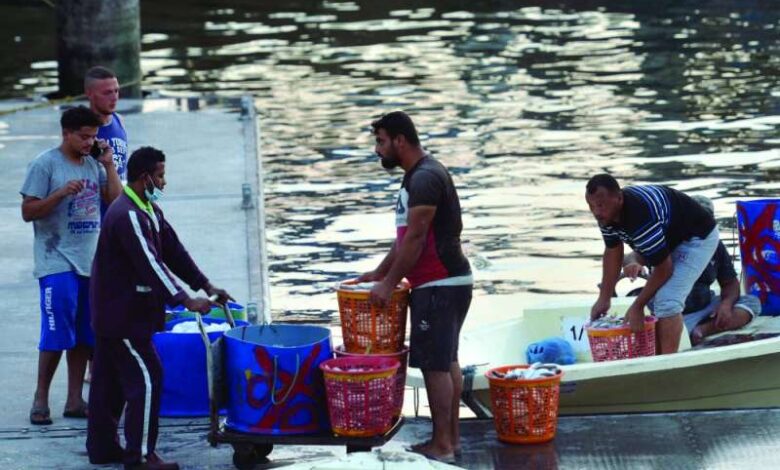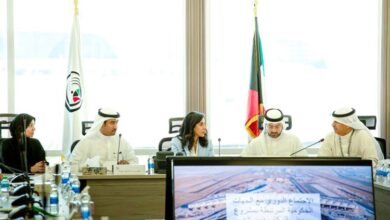Experts warn Kuwait’s fish stock cannot handle new licenses
Given the current severe shortage and the risk of depleting the fish stock with increased catches, priority should be given to addressing issues concerning current license holders.

• The author of the field opinion outlined various reasons why expanding license issuance would be ineffective, citing diminishing seafood stocks, high costs associated with limited fishing areas, and a shortage of fishermen.
• The author of the scientific and environmental opinion cautioned about potential threats to future food security and biodiversity if licenses are haphazardly opened.
Following an official request to prompt the General Authority for Agriculture and Fisheries to promptly issue fishing licenses, aiming to disrupt monopolies, boost supply, and lower prices after a 40-year suspension, experts in marine sciences and fishing operations have confirmed that the fish stock cannot withstand the issuance of new licenses. This is due to an existing severe shortage, with an increased catch likely to deplete rather than enhance supply, ultimately jeopardizing the remaining fish stock. Therefore, priority should be given to resolving issues concerning current license holders.
The author of the field opinion listed several reasons why expanding license issuance would be futile, ranging from dwindling seafood stocks and limited fishing areas with high costs to a scarcity of fishermen.
On the other hand, the author of the scientific and environmental opinion cautioned about potential threats to future food security and biodiversity if licenses are haphazardly opened. They emphasized that effective fisheries management requires measures such as setting fishing quotas, implementing ban periods, and safeguarding crucial environmental habitats, citing international experiences as evidence.
Current fish stocks are too fragile for more licenses

Dhaher Al-Suwayyan, the leader of the Kuwaiti Fishermen’s Union, firmly opposed the idea of issuing new licenses. He emphasized that resolving issues with current licenses should take precedence before considering any new permits.
Al-Suwayyan underscored that the current fish stocks are too fragile to withstand additional licenses. Furthermore, he pointed out that the permitted fishing area covers less than 50 percent of the total marine area.
Shortage of 1,000 licensed fishermen.
He revealed that a large number of fishermen have immigrated to other Arab countries where better fishing conditions are available, and they do not want to return. There is a shortage of workers with existing licenses of approximately 1,000 fishermen, and he wonders, “How do we grant new licenses before solving the old problems?” He concluded that “the fishing profession has become expelled, and expenses do not cover the operational cost due to some ill-considered decisions, including reducing the share of subsidized diesel for fishermen, and stopping bringing in new workers of nationalities on which we depend almost completely,” stressing that the failure of some neighboring countries to adhere to the ban seasons exacerbates the economic losses of fishermen.
Two boat mooring spots
Al-Suwayyan justified his refusal to open new licenses citing another reason related to boat and ship docking spots, stating, “There are only two designated naqats for docking ships and boats, namely Naqat Sharq and Naqatal-Fahaheel, both of which are already crowded and cannot accommodate additional vessels.”
He also mentioned that fishing licenses were suspended by a decision of the Council of Ministers since 1984. This decision was made due to several reasons, primarily the abundance of licenses and the limited marine area, with subsequent reductions occurring after the Iran-Iraq war.
No monopoly
Al-Suwayyan refuted claims of monopolistic practices, emphasizing that there is no monopoly in the fishing industry. He stated that the fish are sold at public auctions, just like in other markets, and prices are determined by the law of supply and demand. He also noted that the participation of restaurants, hotels, parallel markets, cooperative societies, and companies in the auctions contributes to price increases.
Need to implement sustainable fisheries management

Environmental expert Dr. Muhammad Al-Sayegh emphasized that in light of the ongoing discussions regarding the opening of fishing licenses in Kuwait with the objective of lowering prices, we must approach this proposal from a comprehensive scientific and environmental perspective. This includes considering aspects such as food security and marine biodiversity. He explained that “the latest research and studies show that fish stocks in Kuwaiti waters are already under multiple pressures, including overfishing of certain species. This highlights the urgent need to implement sustainable fisheries management.”
Sustainability is a key element
He emphasized that “opening licenses without developing a comprehensive and thoughtful strategy may increase pressure on these stocks, threatening food security and biodiversity in the future.” Numerous international experiences have shown that effective fisheries management must include setting fishing quotas, implementing ban periods, and protecting important environmental habitats to ensure the sustainability of these resources for future generations.
He pointed out that “it is necessary to view sustainability as an essential element, not only to preserve biodiversity but also as a guarantee of Kuwait’s long-term food and economic security.” He added, “This requires us to follow responsible fishing methods that ensure the continuous replenishment of fish stocks.”
Environmental impact assessment
He concluded that before making any decision regarding the opening of licenses, we should conduct a comprehensive environmental impact assessment and consider alternatives such as promoting sustainable fish farming and organizing consumer awareness campaigns about the importance of consuming fish from sustainable sources.
It is essential that any future step be based on accurate scientific data and encourage dialogue and cooperation between all concerned parties, including the government, fishermen, scientists, and civil society, to ensure that decisions support both the economy and the environment in a balanced and sustainable manner.
Five reasons for high prices
- Lack of support for local products.
- Halving the share of subsidized diesel.
- Suspension of issuing entry visas to new workers for over a year.
- Neighboring countries’ non-compliance with seasonal curfews.
- Participation of restaurants, hotels, and companies in auctions.
Five reasons for not opening licenses
- Depleted fish stocks.
- Failure to resolve issues of current license holders.
- Migration of fishermen from Kuwait.
- Restriction on license holders bringing in fishermen of specific nationalities.
- Low economic returns due to high operating costs of boats.
Procedures before opening licenses
- Conduct a comprehensive environmental impact assessment.
- Explore alternatives, such as sustainable aquaculture.
- Conduct consumer awareness campaigns regarding sustainable sourcing.
- Base any future steps on accurate scientific data.
- Foster dialogue and cooperation among all stakeholders, including the government.
- Ensure support for the economy and the environment in a balanced and sustainable manner.













